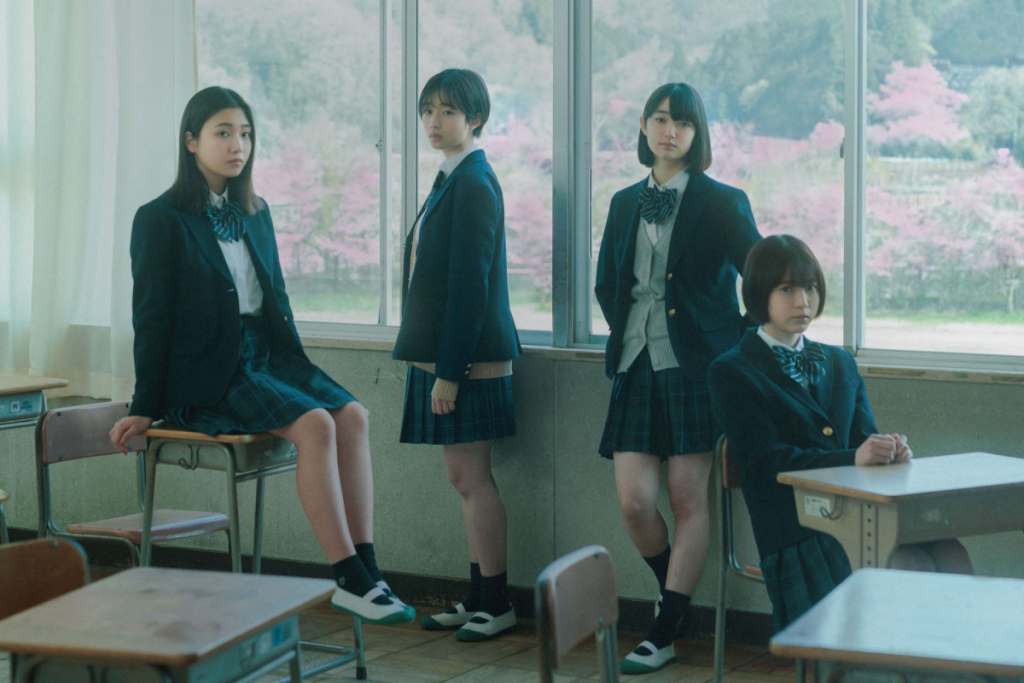3 min. read
Our teen years are some of the most crucial areas of our lives. Much of that time is spent in a school environment where the evident part of growing up, ultimately, means learning how to let go. This theme sits at the core of Shun Nagakawa’s 2023 release, Sayonara, Girls., based on Asai Ryo’s 2012 novel.
The soon-to-be demolished Shimada High School is where it all comes to a head for a quartet of girls – Manami (Yuumi Kawai, Yuki (Rina Ono), Kyoko (Rina Komiyama), and Sakuta (Tomo Nakai) – as the story kicks off at just a little over a day from graduation. Manami’s turmoil is made vaguely clear in the resonant silence in one of her character’s first scenes as the class runs through graduation rehearsal, when she’s called up to the podium.
That stoicism extends a little further to Yuki who is currently falling out with her boyfriend Terada (Usa Takuma) for reasons described initially as superficial, as well as Sakuta, whose struggles with anxiety continue to make it hard for her to be sociable with anyone, with exception to the school’s kind librarian. Meanwhile, Kyoko is charged with producing the school’s final day performance between three bands, including the beleagured Heaven’s Door led by lead singer and Kyoko’s friend from junior high, Morisaki (Himi Sato).
The growing pains are brought full circle for each student in their efforts to right some wrongs and make themselves and their peers whole. Revelations arise between Yuki and Terada, as well as for Kyoko who learns that the members of Heaven’s Door aren’t as prepared as she hoped they would be, leaving Morisaki to take the wheel as a solo act. As for Sakuta, the urge to change and become more sociable takes precedent, particularly with the help of a book she’s long held onto.
With Manami, we don’t get the full scope of her sadness until well into the second half of the film. In two scenes, we are introduced to Shun (Airu Kubozuka), someone Manami is particularly close to. In the second scene, they gather for a private classroom picnic with homemade lunches made by Manami, and each lunch is themed with the flag of a different country.
This scene occurs a while after Manami is advised to make some last minute adjustments to her speech using personal experiences throughout the campus. It’s a peculiar development idea that slowly peels back the layers of Manami’s motivations, coupled with a pair of flashbacks that are shown in the film’s second half.
Sayonara, Girls. is a poignant coming-of-age tale that toils away at exposition for much of its two hour duration. The performances are delightful and piquant enough that they don’t take away from this cinematic treatment, and a few areas of the film tend to be a tad unnerving to the point where you know something omnious is taking place. The film does an ample job at leaving this aspect of the film up in the air so as to not give itself away.
Nakagawa’s latest serves up a teen drama that brings insight to the kind of hard knocks that come with young adulthood. Each relationship is tethered to lessons in healing, whether it be angst, romantic heartbreak, or grief. Culminating a poignant message flick on growth and transitioning, Sayonara, Girls. lets you know that it’s okay to hurt, that you’re not alone, and that your teen years aren’t the end of everything.
Sayonara, Girls. was reviewed for the 17th edition of Japan Cuts which runs from July 10 through 21.


